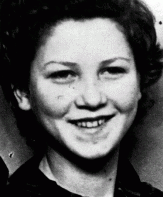You searched for: 谷歌推广平台必须找代理商吗【TG飞机:@bapingseo】代谷歌竞价seo投放包上【TG电报:@bapingseo】斯洛伐克资源通道【Telegram:@bapingseo】彩之云下载购彩ivapp下载手机版久旺28登录电脑版?9UsP9e/0sPZhS.html
<< Previous | Displaying results 351-375 of 459 for "谷歌推广平台必须找代理商吗【TG飞机:@bapingseo】代谷歌竞价seo投放包上【TG电报:@bapingseo】斯洛伐克资源通道【Telegram:@bapingseo】彩之云下载购彩ivapp下载手机版久旺28登录电脑版?9UsP9e/0sPZhS.html" | Next >>
-
Gisella Renate Berg
ID CardGisella lived with her parents, grandparents, uncle, and older sister, Inge, in Lechenich, a small village outside of Cologne. The Bergs were an observant Jewish family. Gisella's grandfather was the president of the local synagogue association and her uncle was the cantor. Her father, Josef was a respected cattle dealer, who had many business and personal contacts with their Jewish and non-Jewish neighbors. 1933–39: Gisella was born several months after the Nazis came to power. Her parents feared for…
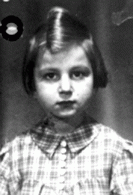
-
Susi Hilsenrath
ID CardThe Hilsenraths lived in Bad Kreuznach, a city in western Germany with a Jewish community that dated back to the 13th century. Susi was the eldest of three children. Her father owned a thriving linen store, and her mother took care of Susi and her two brothers. 1933–39: After the Nazis came to power, the Hilsenraths, like other Jewish families, began to feel the effects of increased antisemitism. Susi was forced to leave the public school, along with the other Jewish children. Even walking on the…
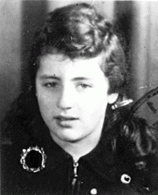
-
Cecilie Klein-Pollack
ID CardCecilie was the youngest of six children born to a religious Jewish family in the Czechoslovakian town of Yasinya. Her father, who was from Poland, taught private lessons in math and German. The family owned a small grocery store, which Cecilie's mother managed. 1933-39: Cecilie's father died in 1934 when she was 9. In March 1939 Hungary, which was sympathetic to Nazi Germany, annexed the area of Czechoslovakia where they lived. One day, Cecilie arrived home to find her mother and sister had been arrested…
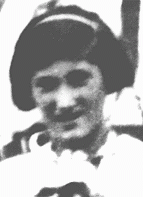
-
Urszula Kaczmarek
ID CardUrszula was one of four children born to Franciszek and Jadwiga Kaczmarek, who lived in the industrial city of Poznan in western Poland. The family lived at 11 Smolnej Street. Like their parents, the Kaczmarek children were baptized in the Roman Catholic faith. 1933-39: As one of the older children in the family, Urszula helped her mother with the housework. She was 10 years old when the Germans invaded Poland on Friday, September 1, 1939. German planes bombed Poznan that same day, and German troops…
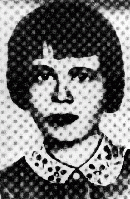
-
Joseph von Hoppen Waldhorn
ID CardJoseph was the youngest of three children born to immigrant Jewish parents. His Polish-born father was a former officer in the Austro-Hungarian army who had met and married Joseph's Hungarian-born mother during World War I. Joseph was raised in a religious household and grew up speaking French. 1933-39: Joseph's mother says it's better here in Paris than in the poor village where she grew up. Unlike his mother, who speaks broken French, Joseph and his older sisters have grown up speaking French fluently.…
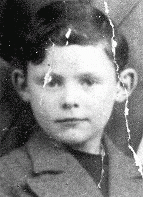
-
Paula Wajcman
ID CardPaula was raised in a religious Jewish family in Kielce, a city in the southeast of Poland. Her family lived in a modern two-story apartment complex. Paula's father owned the only trucking company in the district. Her older brother, Herman, attended religious school, while Paula attended public kindergarten in the morning and religious school in the afternoon. 1933-39: Paula's school uniform was a navy blazer with a white blouse and pleated skirt. At age 9, she did the "Krakowiak" dance at school. Boys…
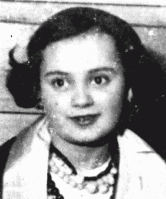
-
Abraham Wijnberg
ID CardAbraham, or "Braham" as he was nicknamed, was the oldest of four children. When Braham was 14, his Jewish parents moved to the town of Zwolle, where they built a kosher hotel. Braham attended Dutch public schools. Monday through Thursday afternoons he also went to religious school where he learned Hebrew, Jewish history and the Bible. 1933-39: Abraham felt that it was a shame that he had to forfeit a scholarship to college in Groningen, but he had to stay in Zwolle to help his parents with the hotel.…
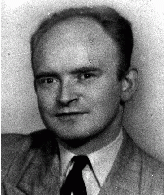
-
Feige Schwarzfink
ID CardFeige was born to a religious Jewish family in the small village of Szydlowiec [in Poland]. She lived with her parents, six brothers and sisters, and elderly grandparents in a small house which, like many homes in the village, had no running water, indoor plumbing, or electricity. Feige's father was a shoemaker. 1933-39: In the afternoons after public school Feige studied at a Jewish religious school. Although her parents didn't know it, she attended meetings of the Bund, the Jewish Socialist party. Feige…
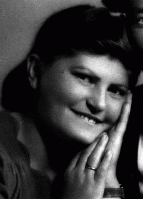
-
Aron Tabrys
ID CardAron was the second of six children born to Jewish parents in Vilna, a city known as a center of Jewish cultural life. He was called Arke by his friends and family. Aron's father supported his large family on the meager income of a chimney sweep. 1933-39: As a child Aron attended a Jewish day school, and then went on to attend a public secondary school. When he was 14 his father had an accident which rendered him blind, and Aron had to start working full-time to support the family. Aron belonged to an…
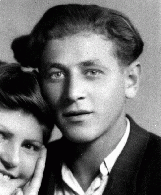
-
Norbert Yasharoff
ID CardNorbert was born to a Jewish family in the Bulgarian capital of Sofia. His father, a prominent lawyer, was also active in the Jewish community, heading relief efforts for the city's Jewish orphans. Sofia was home to approximately half of Bulgaria's estimated 50,000 Jews during the mid-1930s. 1933-39: On September 1, 1939, while on a family vacation the Yasharoffs heard over the radio that war [World War II] had begun. Norbert's parents exchanged worried glances; what would happen to them now? Bulgaria had…
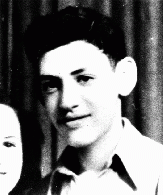
-
Edith Fuhrmann Brandmann
ID CardEdith's village of Kriesciatik was located on the border between Romania and Poland. Her Jewish parents owned a large ranch where they raised cattle and grew sugar beets. They also owned a grocery store. Edith had a brother, Jacob, and a sister, Martha. At home the family spoke Yiddish and German, and Edith learned Romanian after she began school. 1933-39: Edith's village was by a river, and she spent summer days by the water with her friends, swimming and playing. Her mother would pack her bread and…
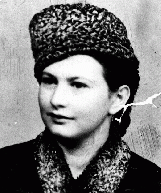
-
Gertruda Nowak
ID CardGertruda was one of five children born to a poor family in the rural community of Zegrowek in western Poland. The Nowaks lived near Gertruda's grandparents. Like their parents, Sylwester and Joanna Nowak, the Nowak children were baptized in the Roman Catholic faith. 1933-39: As a young girl, Gertruda helped with chores around the house, and after school she looked after her younger brothers and sisters. She was 9 years old when the Germans invaded Poland on September 1, 1939. Nazi troops reached Zegrowek…
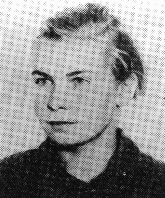
-
Elsa (Eliska) Skutezka Kulkova
ID CardElsa was the eldest of three children born to Jewish parents in Brno, the capital of Moravia, where her father ran a successful shipping company. In 1920 she graduated from a German-language secondary school. She married and moved to Bratislava, but the marriage was unsuccessful and Elsa returned to Brno in 1926, where she opened a millinery business. 1933-39: On May 24, 1933, Elsa married Robert Kulka and the couple settled in Robert's hometown of Olomouc. Their son, Tomas, was born a year and a day…
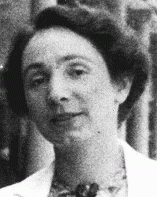
-
Helene Herta Katz Wohlfarth
ID CardHelene, called Herta, was born to a Russian-Jewish father and a German-Jewish mother in a town on the Main River, near Frankfurt. Her father had immigrated to Germany from Russia in 1890. Her mother had automatically taken on her husband's Russian citizenship when she married. In 1914 Russia and Germany went to war, and Russians living in Germany were considered "enemy aliens." 1933-39: Herta married Siegfried Wohlfarth in 1933 and could change from being "stateless" to taking on his German citizenship.…
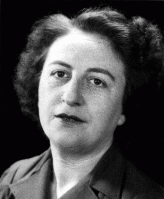
-
Ethel Stern
ID CardEthel was born to a Jewish family living in Warsaw. When she was 9, her family moved to the town of Mogielnica, about 40 miles southwest of Warsaw. Ethel's father spent much of his time studying religious texts. His wife managed the family liquor store. Ethel attended public school during the day and was tutored in religious studies in the evening. 1933-39: Ethel had always wanted to be a teacher. At age 14, after attending religious school in Lodz, she began to teach in the town of Kalisz, where her…
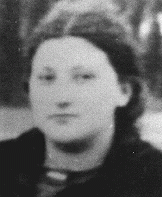
-
Yosel Coller
ID CardOne of six children, Yosel was raised in a religious Jewish family in Lodz, an industrial city in western Poland. His father was a businessman. At the age of 6, Yosel began attending a Jewish day school. His two older sisters attended public school in the morning and religious school in the afternoon. Yosel spent much of his free time playing soccer with his brothers. 1933-39: Yosel's family lived in a modest house in the northern section of Lodz. He went to a Jewish day school and had many friends there.…
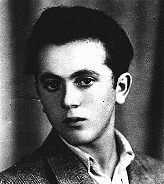
-
Gerda Blachmann
ID CardGerda was an only child of Jewish parents. They lived in Breslau, a large industrial city on the Oder River. Before World War II, Breslau's Jewish community was the third largest in Germany. Her father worked as a salesman for a large hardware and building materials company. Gerda attended public school until age 9 when she was admitted to a Catholic girls' school. 1933-39: Gerda walked through the city to see the aftermath of a pogrom. The windows of Jewish shops had been shattered. A torched synagogue…
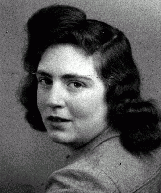
-
Shulim Saleschutz
ID CardShulim was the oldest of three children born to religious Jewish parents living in Kolbuszowa, a town in south central Poland. His father owned a wholesale general store in town, and was known in the region for his impressive strength. Shulim's mother tended to the house and cared for him, his brother, Shlomo, and his sister, Rozia. 1933-39: When Shulim was 9, the Germans invaded Poland. Polish soldiers on horses tried to fight against the German army, but they were no match against the tanks. After the…
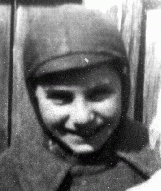
-
Ema Schwarzova Skutezka
ID CardOne of two children born to religious Jewish parents, Ema was raised in the small Moravian town of Lomnice, where her mother ran a general store. In 1901 Ema married Eduard Skutecky, a regular customer at her mother's store. The couple settled in the city of Brno, where they raised three children. Eduard ran a shipping company. 1933-39: By 1933 Ema's three children were grown and had moved out. Four years later her husband passed away, and Ema moved in with her eldest daughter, Elsa. Elsa and her husband…
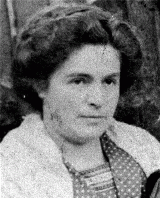
-
Agnes Mandl
ID CardWhen Agnes was a teenager, she attended Budapest's prestigious Baar Madas private school, run by the Hungarian Reformed Church. Although she was the only Jewish student there, Agnes' parents believed that the superior education at the school was important for their daughter. Agnes' father, a textile importer, encouraged his daughter to think for herself. 1933-39: In 1936 Agnes studied educational techniques with Signora Maria Montessori in Italy and earned a diploma so she could teach. Hoping to improve…
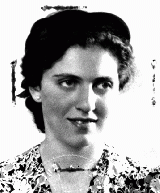
-
Johann (Hansi) Stojka
ID CardHansi, as he was called by family and friends, was the third of six children born to Roma ("Gypsy") parents who were Roman Catholic. The family wagon traveled with a caravan that spent winters in Vienna, Austria's capital, and summers in the Austrian countryside. The Stojkas belonged to a tribe called the Lowara Roma, who made their living as itinerant horse traders. 1933-39: Hansi grew up used to freedom, travel and hard work. He was 9 years old and their wagon was parked for the winter in a Vienna…
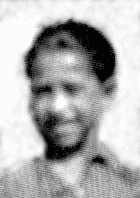
-
Berthold Mewes
ID CardBerthold was an only child. He was raised in Paderborn, a town in a largely Catholic region of western Germany. Paderborn was near Bad Lippspringe, where there was a Jehovah's Witnesses congregation engaged in missionary work. Beginning in 1933, the Nazis moved to outlaw Jehovah's Witness activities. 1933-39: When Berthold was 4, his parents became Jehovah's Witnesses and he began to attend secret Bible meetings with them. Berthold began public school in 1936. His mother was arrested in 1939 and sent to…
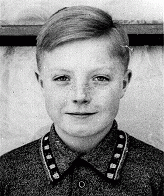
-
Anna Pfeffer
ID CardAnna, affectionately known as Aennchen to her family, was the daughter of non-religious German-Jewish parents. Her father died when she was young and Anna was raised in the town of Bruchsal by her impoverished mother. Anna married a well-to-do, older gentleman in 1905 and moved to the fashionable city of Duesseldorf, where he was a department store manager. By 1933 they had two grown sons. 1933-39: The Pfeffer's comfortable life unraveled after the Nazis came to power. The Nazis arrested Anna's brother…
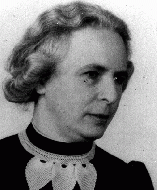
-
Dora Unger
ID CardDora, her parents, brother, aunt, uncle, and two cousins lived together in her grandfather's home in Essen, Germany. The Ungers were an observant Jewish family, and when Dora was 8, she began to regularly attend meetings of Brit HaNoar, a religious youth organization. 1933-39: In October 1938 a teacher, with tears in her eyes, came to Dora at the municipal pool, saying "Jews cannot swim here anymore." Just weeks later, on November 9, Jews were arrested and their property destroyed. A neighbor tried to…
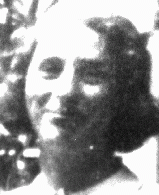
-
Judith Beker
ID CardJudith was one of three children born to a Yiddish-speaking Jewish family living on a farm near the Lithuanian town of Jonava. Judith's mother had an extensive Jewish education and taught her daughters at home. Her son, Abe, attended a Jewish religious school in Jonava. Judith's father worked in the logging industry. 1933-39: In the fall of 1938, six months after her father died, Judith and her mother moved to Kovno, the capital of Lithuania. She was 9 years old. Kovno at that time had a large Jewish…
